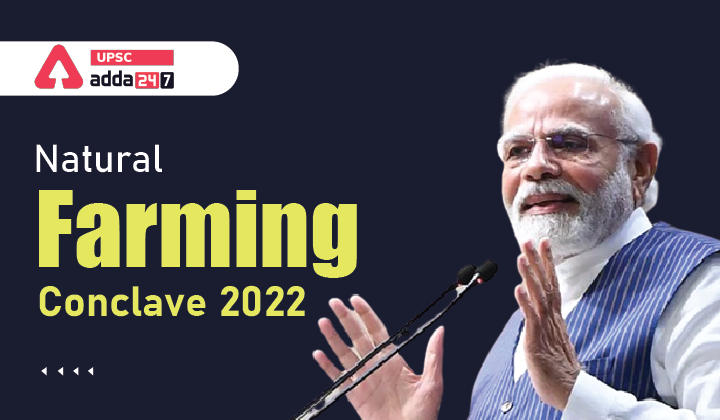Table of Contents
Natural Farming Conclave- Relevance for UPSC Exam
- GS Paper 2: Governance, Administration and Challenges- Government policies and interventions for development in various sectors and issues arising out of their design and implementation.
Natural Farming Conclave in News
- Recently, the Prime Minister, Shri Narendra Modi addressed a Natural Farming Conclave via video conferencing.
- He said that Natural Farming Conclave 2022 is an indication of how Gujarat is leading the country’s resolution of achieving the goals of the Amrit Kaal.
- He said the “Surat model” of natural farming could become a model for the whole country.
- As part of Azadi ka Amrit Mahotsav, Prime Minister in his address at Gujarat Panchayat Mahasammelan in March, 2022 had exhorted at least 75 farmers in each village to adopt the Natural way of farming.
Natural Farming Conclave
- About: Natural Farming Conclave is being organized by in Surat, Gujarat, for promoting the Natural Farming and its benefits in India.
- Participation: Natural Farming Conclave is witnessing participation of thousands of farmers and all other stakeholders who have made adoption of Natural farming in Surat a success story.
- The conclave was also attended by the Governor and Chief Minister Gujarat.
- Surat Model of Natural Farming:
- In Surat, village committees, taluka committees and district committees were formed to select 75 farmers from each village panchayat to get into natural farming.
- This resulted in more than 40,000 farmers from over 550 panchayats taking up natural farming in a short span of time.
- Other Models: five-km natural farming corridor is being developed along both banks of the river Ganga.
- Such corridors can also be developed on the banks of the Tapi and the Narmada rivers.
Analysis of Down To Earth Magazine: Natural Farming
What is Natural Farming?
- About: Natural Farming is a chemical-free alias traditional farming method. Natural Farming is considered as agroecology based diversified farming system which integrates crops, trees and livestock with functional biodiversity.
- Natural Farming Practice in India: It is roughly estimated that around 2.5 million farmers in India are already practicing regenerative agriculture (Natural Farming).
- In the next 5 years, it is expected to reach 20 lakh hectares- in any form of organic farming, including natural farming, of which 12 lakh hectares are under BPKP.
Bharatiya Prakritik Krishi Paddhati Programme (BPKP)
- About: Bharatiya Prakritik Krishi Paddhati Programme (BPKP) is a scheme to promote Natural Farming under centrally sponsored scheme- Paramparagat Krishi Vikas Yojana (PKVY).
- Key Objective: BPKP is aimed at promoting traditional indigenous practices which reduces externally purchased inputs. It is largely based on-
- On-farm biomass recycling with major stress on Biomass mulching,
- Use of on-farm cow dung-urine formulations;
- Periodic soil aeration and
- Exclusion of all synthetic chemical inputs.
- Importance: natural farming is expected to reduce dependency on purchased inputs and will help to ease smallholder farmers from credits burden.
- Natural Farming is considered as a cost- effective farming practices with scope for raising employment and rural development.
Zero Budget Natural Farming can Lead to Yield Loss




 TSPSC Group 1 Question Paper 2024, Downl...
TSPSC Group 1 Question Paper 2024, Downl...
 TSPSC Group 1 Answer key 2024 Out, Downl...
TSPSC Group 1 Answer key 2024 Out, Downl...
 UPSC Prelims 2024 Question Paper, Downlo...
UPSC Prelims 2024 Question Paper, Downlo...




